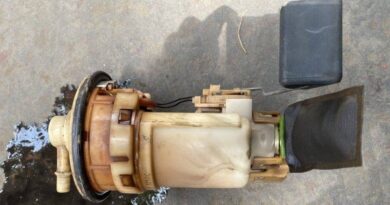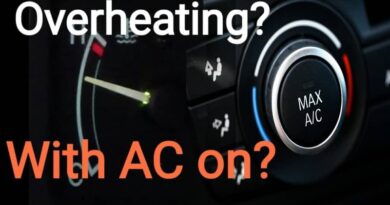
Have you ever been driving your automobile when it abruptly turns off, just to restart a short while later? You may be left wondering what went awry with your car and whether it’s safe to keep driving it after the spine-chilling incident.
Automobiles are fabricated with a lot of modern technology in mind; however, they continue to have numerous common issues. A variety of diverse factors may be the cause if you have this problem. These factors include an electrical issue, a fuel system issue, or simply an overheated engine.
It can be hazardous and annoying if a car shuts down while you’re driving and then restarts.
This video will comprehend the potential sources of this problem and practical fixes.
This article will discuss the typical causes why your car turned off while driving but turns back on and how to avoid them.
Understanding What Would Cause a Car to Shut Off While Driving
Lack of Fuel:
In case the gasoline tank of your car is empty, it may deprive the engine of fuel and cause an unforeseen shutdown.
In contrast, when the tank isn’t completely vacant of fuel and instead has some remaining amount left inside it, there’s a possibility that, at times, the gasoline pump may commence taking in petrol. This action then permits the continuous functioning of the vehicle.
Ignition System Issues
Faulty ignition components, such as a malfunctioning ignition switch or a failing ignition coil, can disrupt the engine’s spark, leading to a temporary shutdown. Once the ignition system regains stability, the car can start again.
Electrical Problems
Electrical issues that result in intermittent power loss and engine shut-off include unsecured wiring connections, a malfunctioning alternator, and a weak battery. The electrical system can function again if the automobile is restarted.
Overheating Engine
If coolant leaks occur or a broken thermostat or damaged radiator in an automobile leads to overheating, it may perform an automatic shutdown for safety reasons. To prevent further damage or potential accidents, this action is taken.
The vehicle may resume once the engine slows down or the problem is fixed.
Faulty Sensors
Incorrect signals can be sent to the engine control unit (E.C.U.) via malfunctioning sensors such as the crankshaft position sensor or camshaft position sensor, which can cause the engine to shut down suddenly. The automobile can be restarted after the E.C.U. has accurate data.
Other Mechanical Issues
Several technical issues can interfere with The engine’s running, such as a failing fuel pump, clogged fuel filter, a damaged airflow sensor, or a worn-out timing belt, which can cause a brief shutdown.
How to troubleshoot the Issue?
Inspect the Ignition System
Have a professional mechanic examine the ignition system components, including the ignition switch, ignition coil, and spark plugs, for any signs of wear or malfunction. Replace faulty parts if necessary.
Examine the Electrical Components
Inspect the wiring connections, battery terminals, and alternator for loose or damaged parts. A certified technician can perform a detailed electrical system inspection to identify and rectify any issues.
Monitor Engine Temperature
Keep an eye on the engine temperature gauge while driving. If it consistently shows overheating, consult a mechanic to diagnose and resolve the cooling system problem.
Test and Replace Faulty Sensors
Have the sensors in your car tested to ensure they provide accurate readings to the E.C.U? Faulty sensors should be replaced to restore proper engine function.
Address Mechanical Problems
If the issue persists, take your vehicle to a trusted mechanic who can diagnose and fix any mechanical problems causing the intermittent shutdowns.
Prevention Tips
To minimize the chances of your car turning off while driving, consider the following preventive measures:
Regular Vehicle Maintenance
Stick to a routine maintenance schedule, including oil changes, filter replacements, and inspections. This helps identify and resolve potential issues before they lead to unexpected breakdowns.
Warning Signs Car Shuts Off While Driving No Check Engine Light
Consider warning signs such as strange noises, unusual vibrations, or dashboard warning lights. Promptly address these indicators by seeking professional assistance.
Safe Driving Practices
Drive responsibly and avoid pushing your car to its limits. Aggressive acceleration or careless driving might place too much stress on the engine, raising the possibility of unexpected shutdowns.
Conclusion
It can be confusing when an automobile quickly cuts off while you’re driving and then turns back on. There may be several contributing variables, including issues with the ignition system, the electrical system, the fuel system, an overheated engine, defective sensors, or other technical issues.
You may reduce the frequency of such situations and provide a safer and more dependable driving experience by using the aforementioned troubleshooting approaches and taking preventative measures.
F.A.Q.s:
1. Is it safe to keep driving if my car shuts off and restarts?
A mechanic should inspect your car to find the source of the problem and fix it, even though the current problem may correct itself temporarily.
2. Can a faulty battery cause an automobile to turn off while in motion?
A weak or failing battery can cause power disruptions, leading to a car stalling while in motion. It’s recommended to have the battery tested and replaced if necessary.
3. what causes a car to stall while driving?
The specific conditions under which your car stalls while driving can provide valuable clues about the potential cause. It might have something to do with overheating, electrical load, or other things that affect how some parts work.
4. How frequently should my car be maintained to avoid unexpected shutdowns?
Regular maintenance intervals, usually every six months or as advised by your car’s manufacturer, can help find and fix potential problems before they get worse.


